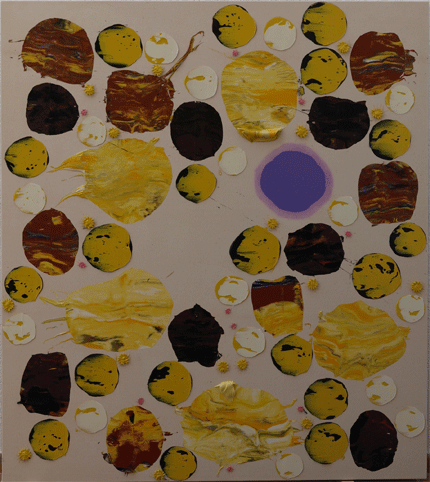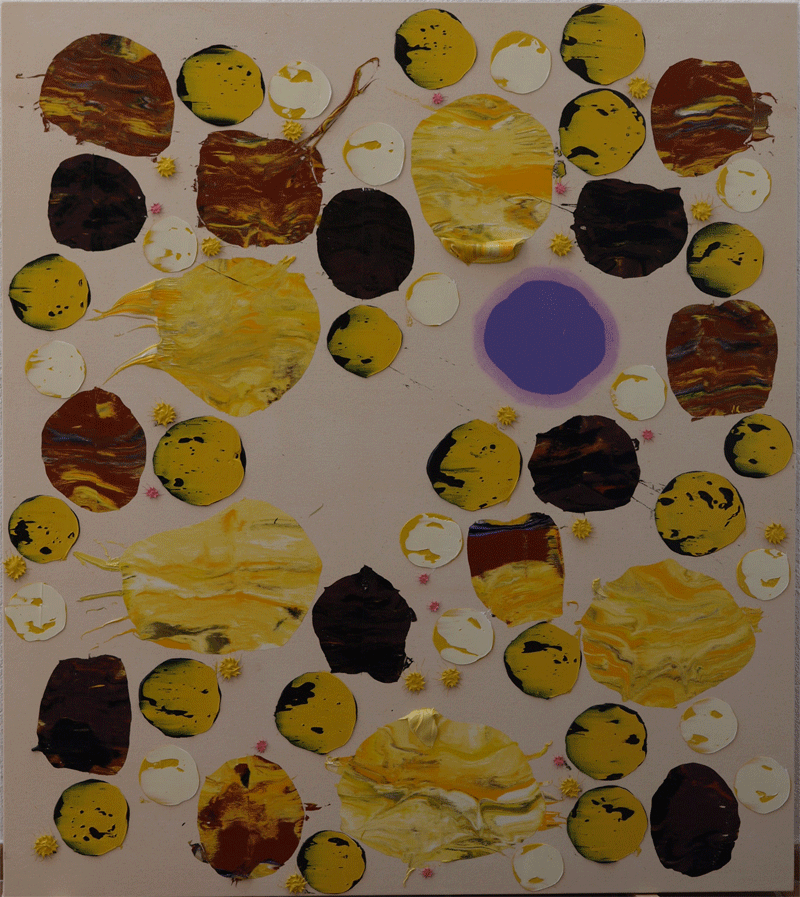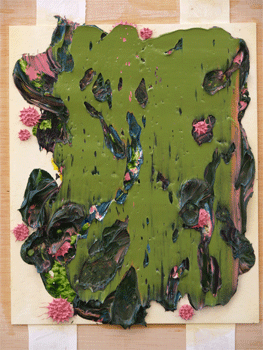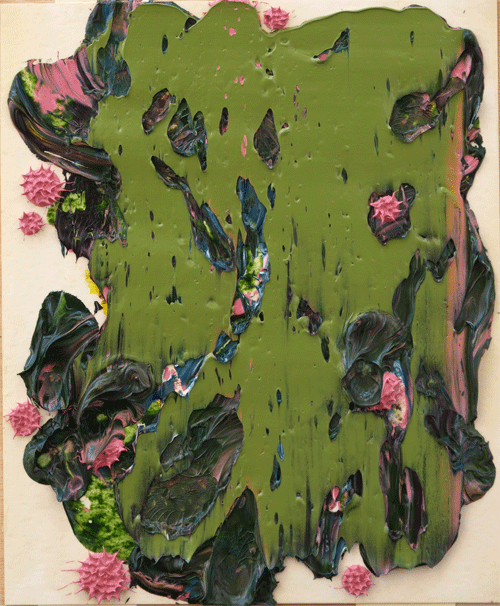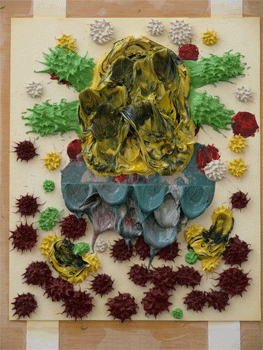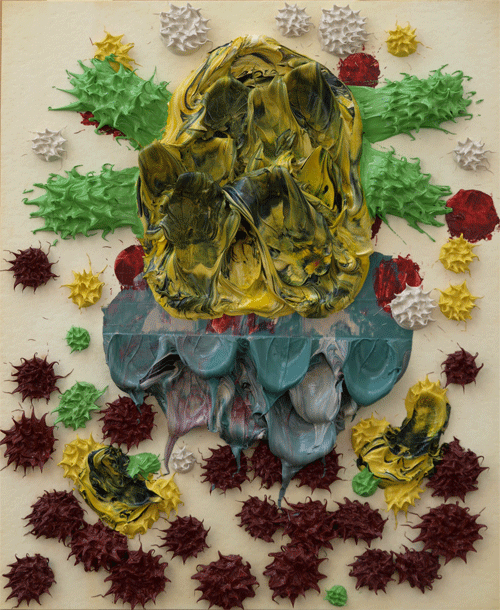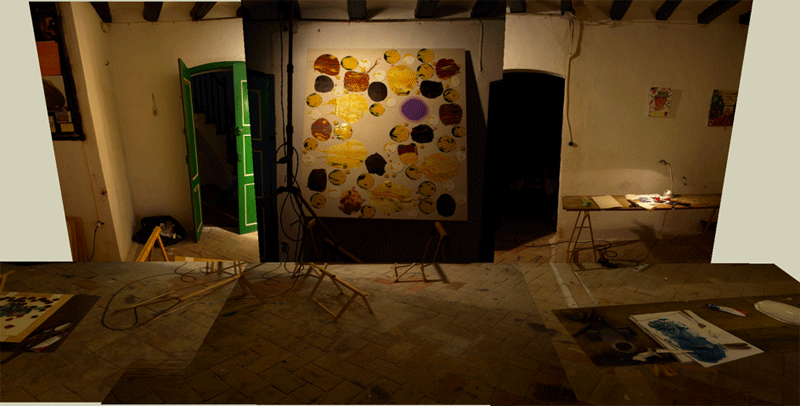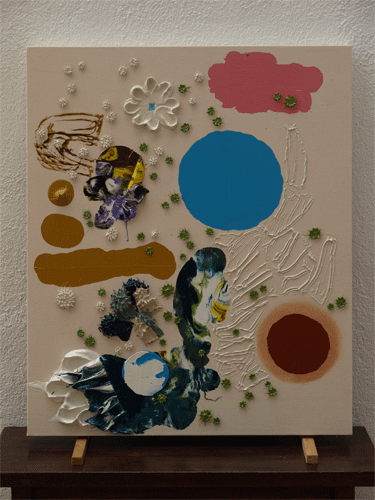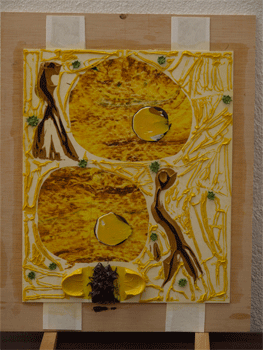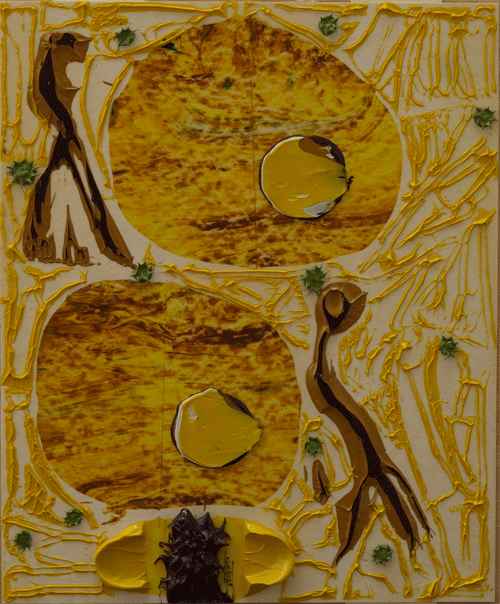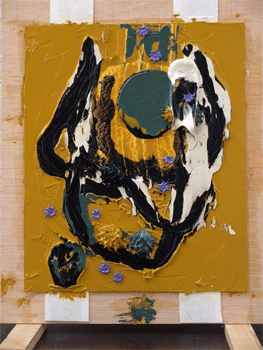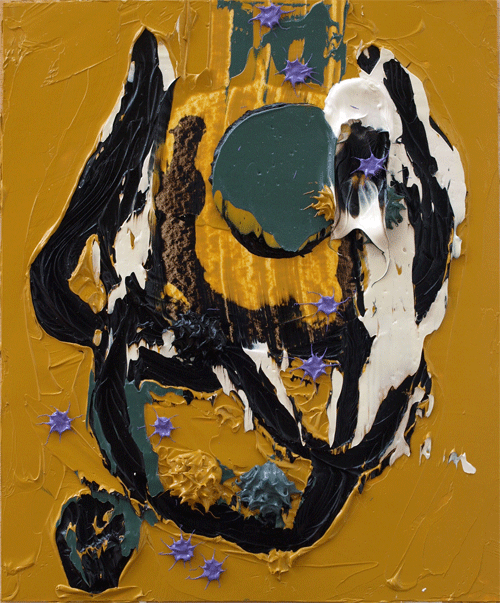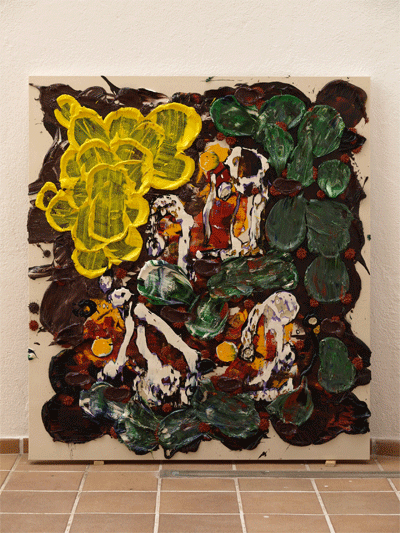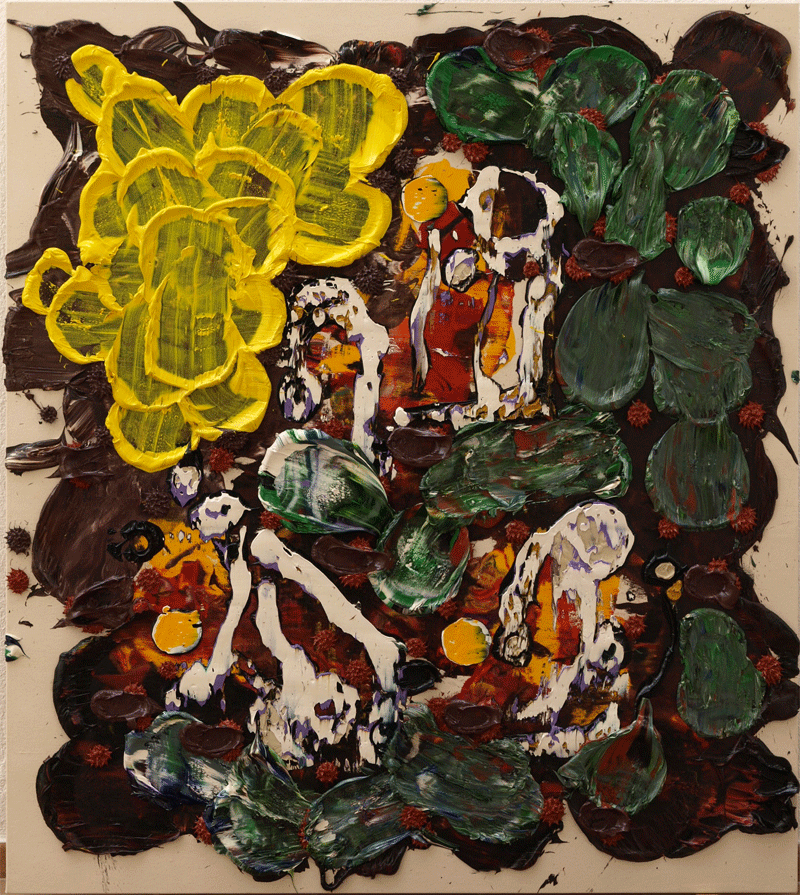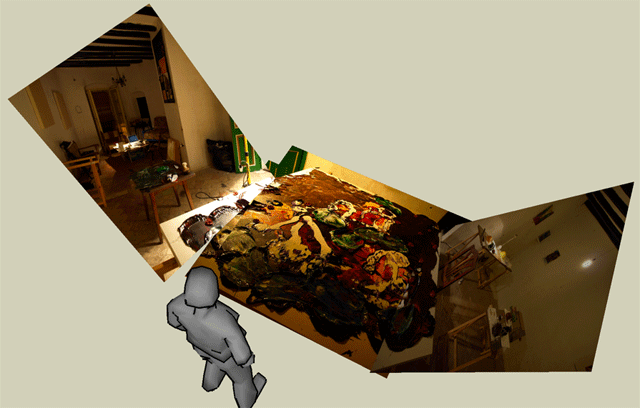September 29, 2008
September 23, 2008
California Coming Home
I like to say that I get that coming-home-feeling, going across both sides of the Atlantic... but it is a bit stronger when I'm flying East to West.
See all y'all soon.
September 21, 2008
September 19, 2008
Esquinas

Cousin Harold snapped this picture as he visited LA (he's in a show this week at Fresh Paint). It's nice to see home telescoped through a friend's megapixels. I'm getting ready to fly back next week, and I am pretty happy about it. That feeling good about coming home feeling goes both ways for me, to/from Spain/California.
Turning corners, es la verdad.
Here's some other shots of the studio on this side of the world:
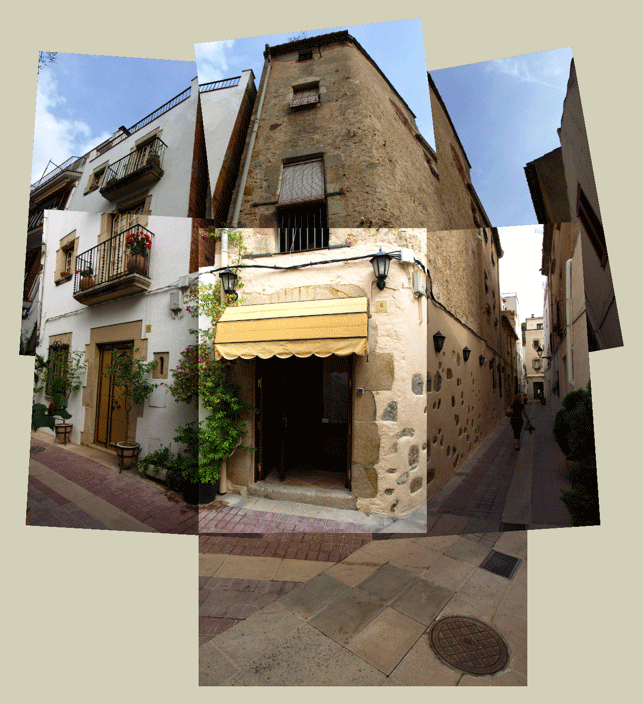
A mi me gusta todos los esquinas.

(Yesterday.)
September 15, 2008
September 11, 2008
All nature's difference keeps all nature's peace

In the summer of our election year, I thought it would be good to brush up on constitutional history, Here are four pages from David McCulloough's John Adams, p.374:
He felt an urgency like that of 1776. Great events were taking place at home. Support for a stronger central government was gaining ground- and largely in reaction to Shays Rebellion, as Adams had foreseen. A constitutional convention was in the offing, and as he had impelled in 1776, to write his Thoughts on Government so Adams plunged ahead now, books piled about him, his pen scratching until all hours. "He is so much swallowed up in the pursuit of his subject that you must not wonder if you do not receive a line from him," Abigale explained to john Quincy. But having read what he was writing, she worried. "I tell him they will think in America that he is setting up a king."*
By early January, 1787, Adams had rushed the first installment of his effort to a London printer. Titled A Defence of the Constitutions of Government of the United States of America, it was, in finished production, more a pamphlet than a book, in octavo form, and included on the title page a line from Pope: "All nature's difference keeps all nature's peace." Copies were sent off at once to the United States and to Jefferson in Paris.
Adams conceded that the writing suffered from too great haste. He called it a "strange book", which in many ways it was, much of it a hodge-podge overloaded with historical references and extended borrowings from other writers and usually without benefit of quotation marks. Yet in all he achieved something quite out of the ordinary, thoughtful, high-minded, and timely. To a considerable extent the book was an expanded, erudite rendition of the case for checks and balances in government that he had championed in his Thoughts on Government, and later put in to operation in his draft of the Massachusetts constitution. the people of America now had "the best opportunity and the greatness trust in their hands" that Providence ever ordained to so small a number since Adam and Eve. There must be three parts to government- executive, legislative, and judicial- and to achieve balance it was essential that it be a strong executive, a bicameral legislature, and an independent judiciary. On the role of the executive, Adams was emphatic:
If there is one central truth to be collected from the history of all ages, it is this: that the people's rights and liberties, and the democratical mixture in a constitution, can never be preserced without a strong executive, or, in other words, without separating the executive from the legislative power. If the executive power, or any considerable part of it, is left in the hands of an aristocratical or democratical assembly, it will corrupt the legislature as necessarily as rust corrupts iron, or as arsenic poisons the human body; and when the legislature is corrupted, the people are undone.Nonetheless, the legislative power was "naturally and necessarily sovereign and supreme" over the executive.
In all history, he declared, there was no greater statesman and philosopher than Cicero, whose authority should ever carry great weight, and Cicero's decided opinion in favor of the three branches of government was founded on a reason that was timeless, unchangeable. Were Cicero to return to earth, he would see that the English nation had brought "the great idea" nearly to perfection. The English constitution, Adams declared- and knowing he would be taken to task for it- was the ideal. Indeed, "both for the adjustment of the balance and the prevention of its vibrations," it was the most stupendous fabric of human invention" in all history. Americans should be applauded for imitating it as far as had been done, but also, he stressed, for making certain improvements i nthe original, especially in rejecting all hereditary positions.
A hereditary monarchy could be a republic, Adams held, as England demonstrated, and hereditary aristocracies could be usefully employed in balanced governments, as in the House of Lords. But Adams adamantly opposed hereditary moonarchy and hereditary aristocracy in America, as well as all hereditary titles, honors, or distinctions of any kind- it was why he, like Jefferson and Franklin, strongly opposed the Society of the Cincinnati, the association restricted to Continental Army officers, which had a hereditary clause i its rules whereby membership was passed on to eldest sons.
As he explained to Jefferson, much of what he wrote was in response to the dangers of radical French thought. Specifically he had written in defence (hence the title) against the theories of the philosophe Turgot, who espoused perfect democracy and a single legislature, or as he wrote, "collecting all authority into one center, that of the nation." To Adams this was patent nonsense. A simple, perfect democracy had never yet existed. The whole people were incapable of deciding much of anything, even on the small scale of a village. He had enough experience with town meetings at home to know that in order for anything to be done certain powers and responsibilities had to be delegated to a moderator, a town clerk, a constable, and, at times, to special committees.
Reliance on a single legislature was a certain road to disaster, for the same reason reliance on a single executive- king, potentate, president- was bound to bring ruin and despotism. As the planets were held in their orbits by centripital and centrifugal forces, "instead of rushing to the sun or flying off in tangents" among the stars, there must, in a just and enduring government, be a balance of forces. Balance, counterpoise, and equilibrium were ideals that he turned to repeatedly. if all power were to be vested in a single legislature, "What was there to restrain it from making tyrannical laws, in order to execute them in a tyrannical manner?"
At home every state but Pennsylvania and Georgia had a bicameral legislature, and because of the obvious shortcomings of the one-house Congress under the Articles of Confederation, agreement on the need for a bicameral Congress was widespread. So to a considerable degree Adams was preaching what had become accepted doctrine at home.
Drawing on history and literature, some fifty books altogether, he examined what he called the modern democratic republics (the little Italian commonwealth of San Marino, Biscay in the Basque region of Spain, the Swiss cantons), modern monarchal and regal republics (England, Poland); as well as the ancient democratic, aristocratic, and monarchical republics including Carthage, Athens, Sparta, and Rome. There were frequent citations in Latin, Greek, and French, extended use of Swift, Franklin, dr. Price, Machiavelli, Guiccaiardini's Historia d'Italia, Montesquieu, Plato, Milton, and Hume, in addition to scattered mentions of Aristotle, Thucydides, Hobbes, La Rochefoucauld, adn Rousseau, as well as joseph Priestly, whom Adams had lately come to know in London.
But for all this it remained at heart a layer's brief for what he had said in his Thoughts on Government, and what he had helped establish in practice in the Massachusetts constitution. Where it departed most notably from what he had written before was in its pronouncements on human nature.
To Adams nothing had changed about human nature since the time of the ancients. Inequities within society were inevitable, no matter the political order. Human beings were capable of great good, but also great evil. thus it had always been and thus it would ever be. he quoted Rousseau's description o f"that hideous sight, the human heart," and recounted that even Dr. Priestly had said that such were the weaknesses and folly of men, "their love of domination, selfishness, and depravity," that none could be elevated above others without risk of danger.
How he wished it were not so, Adams wrote. Thucydides had said the source of all evils was "a thirst of power, from rapacious and ambitious passions," and Adams agreed. "Religions, superstition, oaths, education, laws, all give way before passions, interest and power."
As to the ideal of a nation of equals, such was impossible. "Was there, or will there ever be a nation whose individuals were all equal, in natural and acquired qualities, in virtues, talents, and riches? The answer in all mankind must be in the negative."
Even in America where there was "a moral and political equality of rights and duties," there were nonetheless inequalities of wealth, education, family position, and such differences were true of all people in all times. There was inevitably a "natural aristocracy among mankind," those people of virtue and ability who were "the brightest ornaments and the glory" of a nation, "and may always be made the greatest blessings of society, if it be judiciously managed in the constitution." These were the people who had the capacity to acquire great wealth and make use of political power, and fo rall they contributed to society, unless they could thus become the most dangerous element in society, unless they and their interests were consigned to one branch of the legislature, teh Senate, and given no executive power. Above all, the executive magistrate must have sufficient power to defend himself, and thus the people, from all the "enterprises" of the natural aristocracy.
Adams had believed in a "government of laws and not of men," as he had written in his Thoughts on Government and in the Massachusetts constitution but, as he stressed now in conclusion, "The executive power is properly the government; the laws are a dead letter until an administration begins to carry them into execution.
*
*
*
*Note for the first paragraph above, refer to page 436, which illustrates how our two party system was born, incipient and integral to the creation story of the USA:
Seeing themselves as representing the true spirit of republican ideals, Jefferson, Madison, Freneau, and others allied with them had begun calling themselves Republicans, thus implying that the Federalists were not, but rather monarchists, or monocrats, as Jefferson preferred to say. And while there was as yet some question whether it was Jefferson or Madison who led the Republicans, there was no doubt about who led the Federalists. It was Hamilton, who was more than a match for anyone.So the question of the level of executive power was the dividing line between them, diffused/suffused or concentrated/restrained. One beheld an ideal of democracy (mankind is inherently good) and the other the horror of mob rule (original sin?). I would say that this template has roughly the same coordinates as we have today, except that the names have changed hands at least once along the way.
something to do with raising a flag
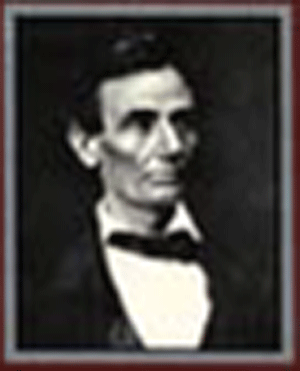
Speech at Independence Hall, Philadelphia Pennslyvania, February 22, 1861:
Mr. Kyler, I am filled with deep emotion at finding myself standing here in the place where were collected together the wisdom, the patriotism, the devotion to principle from which sprang the institutions under which we live. You have kindly suggested to me that in my hands is the task of restoring the peace to our distracted country. I can say in return sir that all the political sentiments I entertained have been drawn so far as I have been able to draw them from the sentiments which originated and were given to the world from this hall in which we stand. I have never had a feeling politically that did not spring from the sentiments embodied in the Declaration of Independence.
I have often pondered over the dangers which were incurred by the men who assembled here and adopted the Declaration of Independence. I have wondered over the toils that were endured by the officers and soldiers of the army that achieved that independence. I have often inquired of myself what great principle or ideal it was that kept this confederacy so long together? It was not the mere matter of the separation of the colonies from the motherland. But something in that declaration is given liberty not alone to the people of this country but hope to the world for all future time. It was that that gave promise that in due time the weights should be lifted from the shoulders of all men, and that all should have an equal chance. This is the sentiment that is embodied in the Declaration of Independence.Now my friends, can our country be saved upon that basis? If it can I will consider myself one of the happiest men in the world if I can help to save it. If it can't be saved upon that principle, it will be truly awful. But if this country cannot be saved without giving up that principle... I was about to say that I would rather be assassinated on this spot and to surrender it. Now in my view of the present aspect of affairs, there is no need of bloodshed and war. There is no necessity for it. I am not in favor of such a course, and I may say in advance there will be no blood shed unless it be forced upon the government. The government will not use force unless force is used against it.
My friends, this is a wholly unprepared speech. I did not expect to be called upon to say a word when I came here, I suppose that was towards something to do with raising a flag. I may therefore have said something indiscrete. But I have said nothing but what I am willing to live by. And in the pleasure of Almighty God, die by.
Dive Tables

I missed a day long dive trip this week, a sacrifice for the altar of Art. Jordi was suggesting I accompany him and his friends as they go to Palamos and to several sites twenty miles out to sea, an excursion promising to last all day. He's one of those deep water snorkelers, 20 -30 meters I think it was he said. We went out locally one recent weekend, and I thought it was strange that he went into the water with a flashlight in the afternoon. He had these elongated fiberglass fins that he used to shoot off like a rocket, it was insane how fast he was. He taught me how you can kick down to see fish taking shelter underneath rock overhangs, his flashlight crashing many fish parties that day. He had a depth gauge too, so I recorded a 14.8 meter dive, woohoo.
On the day he invited me, I got a dose of dive theory in Castella?o. There's a point halfway to the bottom where we have negative buoyancy, so one can kick down to the halfway mark and let gravity do the rest to economize on oxygen use. Lastre fijo are fixed weights, lastre variable are the ones you doff off when you get to the bottom. The graph on the bottom is a time/depth axis with a curve that delineates the safety zone. I lightened up the classroom with a question of why we can't use small bottles to catch a breath of air to lengthen the dive: shorter time, deeper depth. Ha ha, silly me. (?)
Summer Reading

Actually, summer listening. I went all-out into the audiobook world this summer.
Conquistador: Simultaneously tragic and magnificent. Key moment: (all spellings here will be phonetic, there's no online access to check) The alliance of the Totonac chief Tlacosh Kalcuatal. Mexica, the Aztecs were composed of three tribes who together subjugated their neighbors and exacted tribute, a significant part of which were the fodder of human sacrifice. Young men, women, wives... (And by the way: the identity of aboriginal native Americans was anything but singular.) Carnage abounds in this incredible story amidst the significant fact that Cortes was steeped in legal theory and practice and he projected it to the extent that he had a functional Notary in his senior staff.
I see a movie in two parts. Javier Bardem as Cortes? There's a fair bit of rakish jumping in and out of beds in the story, too. Add to this that Cortes was quite articulate and persuasive.
But who would play Malinche?
Churchill: Here's a favorite from his "River War":
All great movements, every vigorous impulse that a community may feel, become perverted and distorted as time passes, and the atmosphere of the earth seems fatal to the noble aspirations of its peoples. A wide humanitarian sympathy in a nation easily degenerates into hysteria. A military spirit tends towards brutality. Liberty leads to licence, restraint to tyranny. The pride of race is distended to blustering arrogance. The fear of God produces bigotry and superstition. There appears no exception to the mournful rule, and the best efforts of men, however glorious their early results, have dismal endings, like plants which shoot and bud and put forth beautiful flowers, and then grow rank and coarse and are withered by the winter. It is only when we reflect that the decay gives birth to fresh life, and that new enthusiasms spring up to take the places of those that die, as the acorn is nourished by the dead leaves of the oak, the hope strengthens that the rise and fall of men and their movements are only the changing foliage of the ever-growing tree of life, while underneath a greater evolution goes on continually.
Lincoln: In his private correspondence, you can better see what a sweet human being he was.
Federalist Papers, Thomas Paine: Here's Paine in Common Sense:
All of those who expose the doctrine of reconciliation: interested men who are not to be trusted, weak men who cannot see, prejudiced men who will not see and a certain set of moderate men who think better of the European world than it deserves and this last class my ill judged deliberation will be the cause of more calamities to this continent than the other three. It's the good fortune of many to live distant from the scene of sorrow. The evil is not sufficiently brought to their doors to feel the precariousness which all American property is possessed. But let our imaginations transport us for a few moments to Boston, that seat of wretchedness will teach us wisdom and instruct us forever to renounce a power in whom we can have no trust... ...men of passive tempers look somewhat lightly over the offenses of Britain and still hoping for the best call out: "Come, we shall be friends again for all this." But examine the passions and feelings of mankind, bring the doctrine of reconciliation to the touchstone of nature and then tell me whether you can hereafter you can love, honor and serve the power who has carried fire and sword to your land. If you can't do all these, then you are only deceiving yourselves. And by your delay, bringing ruin to all posterity
Legacy of Ashes: I prefer Tim Weiner to Howard Zinn in a treatment of the parade of culpability that stains our otherwise distinguished history. I now see after all these years what animated my uncles when they protested Yanqui Imperialism on Manila's university campuses back in the day. We had sown the seeds of the next conflict when we fought the Cold War. What was significant was what was missing (in both Weiner and Zinn): the account of the counter-struggle of our adversaries and an abiding conviction that war is a world of shit where no one comes out clean. Our intellectual class tend to overlook the nature of the martial arts: the dynamic of action/counter-action that precludes idealized planning; the impact of existential consequences; the creation and destruction of pattern and habit; feints and bluffs and the impossibility of achieving true invulnerability.
Compared to perfection, we all fail.
John Adams: Awesomeness. Never had I had such a vivid account of their life and times during the invention of the Constitution. A nice fillet from it I will have of it for you all soon. From my notes:
jefferson- great despite his weaknessesA lingering question: Was Jefferson sanguine about the reign of terror in the French Revolution?
Adams- greater still despite his virtues
Civilization and it's Enemies: Very, very, very interesting. A chunk or two of this to be blogged soon enough.
For Hiroshi

Hiroshi told me once something I already knew: that this painting had something special in it. It was nice to get some confirmation on a twitch of an intuition. the painting is hanging in my hallway, and like a beacon of a lighthouse, it's a signal of landfall and an indication of danger nearby.
Here's a shout out to you Hiroshi.

Emphasis mine
1. I've been fortunate to yet still be a monkey.
I also went to a luncheon at the fuel distribution point here when it was finished and had an interesting conversation with an Iraqi engineer.
Him: ?Are you married??
Me: ?Yes?
?What is your opinion of marriage??
?I?ve been married 13 years; I don?t have an opinion anymore.?
?In Iraq they say a husband is like a monkey, a donkey and a dog. At first she loves you like a pet monkey, then she orders you around like you are a donkey, then you are an old dog, you bark and bark and no one listens.?
?It?s just like that in America too.?
?Is it true in America you only marry one women??
?Yes?
?An in America if you leave she gets half??
?Yes?
He rolls his eyes and says ?Thank God I am Iraqi.?
****
2. I'm a lifelong registered Democrat but for a short time I punched the renegade button and went Non-Partisan. The attitude of "a pox on both of their houses" didn't work for long, I figured that it was ultimately a cop out. Since there is no place for the arts in the Republican Party (short version: Liberals own and are defined by the transgressive mandate, this is why I believe that there's precious few good art on the Right), therefore the only political party for me has to be the Dems. And yet still, there's a totalitarian creep that bugs me about our party (for example, as I left LA there was legislation to ban fast food and smoking outdoors). Finally, I will vote for whomever I want, regardless of party. How can we keep our elected leaders honest when we let them keep us in their pocket? That's a surefire way of letting your voice disappear into groupthink.
And the added bonus: one might thus have a chance to effect --even in a small way- the prospect of a major overhaul of the ideas that underlie not only the Democratic Party but also what it means to be Liberal. Make no small plans, people.
Left in Dark Times, BHL advises, grew out of a phone call he received from Sarkozy on January 23, 2007. The two men go back to Sarkozy's election in 1983 as mayor of Neuilly, the Parisian suburb in which L?vy votes. They'd lunched together many times over the years, developing, L?vy writes, "a kind of friendship." L?vy confesses himself alternately drawn to the brilliant, temperamental Sarkozy, a rightist eager to draw Socialists to his banner in last year's French presidential election, and put off at times by Sarkozy's "show-offy tone." (L?vy makes no mention of a primal underlying awkwardness ? his novelist daughter, Justine L?vy, had her husband stolen a while back by none other than Sarkozy's new wife, Carla Bruni, a tale at the heart of Justine L?vy's novel, Nothing Serious.)...and the most basic conviction relevant here is a belief in freedom, a belief that I think has started to disappear in our cultural milieu. Artists should stop to consider that art as we know it -Western art- wouldn't exist at all without this essential precondition.
The immediate occasion of Sarkozy's call? Andr? Glucksmann, L?vy's old "New Philosopher" peer, had just published a piece in Le Monde endorsing Sarkozy against his Socialist opponent, S?gol?ne Royal. L?vy puts Sarkozy's remarks between quotation marks: "Let's get to the point. What about you? When are you going to write your little article for me? Huh, when? Because Glucksmann is fine. But you, after all, are my friend."
L?vy resists. "Personal relationships are one thing," he replies. "Ideas are another. And no matter how much I like and respect you, the Left is my family."
Sarkozy interrupted him, L?vy recalls, in rough language. "These people who've spent 30 years telling you to go [expletive] yourself? ? Do you really believe what you're saying, that these people are your family?"
L?vy stands his ground, replying, "I've always voted for the Left, and I'm voting for the Left this time, too."
Sarkozy eventually hangs up on him. Though not without, L?vy writes, a slightly "sleazy" insinuation that it's all "an unfortunate misunderstanding" they'll clear up down the line.
The phone call shook L?vy. It's that openness to being shaken in his beliefs ? as when he ventured as a young man to Bangladesh, and later through the hellholes of Pakistan in search of Daniel Pearl's killers ? that makes L?vy more appealing than many of his detractors.
"Had my thinking really become so Pavlovian," he writes, "that, as I'd just said to him, the Left was my family and you don't betray your family?" A week later, L?vy finds himself mouthing something similar to a French weekly embarked "on its umpteenth report" on the rightward drift of French intellectuals. He realizes afterward that his argument from the "family" metaphor is "frankly pathetic ? and even goes against some of my basic convictions."
***
3. Et tu, Facebook?
All that is necessary to create the Facebook Botnet is to have users choose install a rogue Facebook application written by an outside developer -- in this case, one called "Photo of the Day".
Once the user chooses to install the application, the unsuspecting user is inducted into the hacker's army and unknowingly follows orders any time he or she logs into Facebook.
Facebook downplayed the attack, saying that any developer that could figure out how to make a successful application would make money other ways.
The researchers -- mostly affiliated with the Greece-based Institute of Computer Science -- describe their innovation in a paper (.pdf) as a demonstration of an "anti-social network" -- essentially a hijacked social network that can be used for a number of nefarious purposes.
Their demo attack was very simple and surprisingly effective. They created an application that displayed a new National Geographic photo daily on a user's Facebook page -- though the app was not approved of by National Geographic.
But in the background, the application is also downloading three large photos from a targeted site. But the user's browser never displays the images. Any application with enough users will then act like a denial of service attack flooding the chosen website with requests for data. The user stops being a part of the attack after logging out, but joins again every time he returns.
September 3, 2008
September 1, 2008
Foto Shop
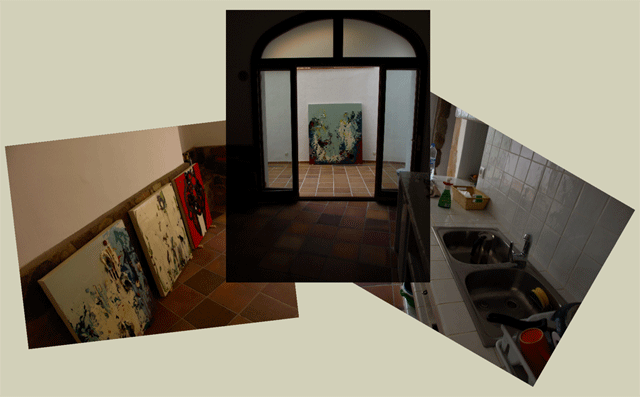
This summer has been tricky getting constant access to an internet connection. My usual pit stop is Hamed's internet cafe nearby, but that is the kind of thing that is good for checking the mail and surfing the news, downloading podcasts... blogposting requires another pitstop or two and last year, it was a pirated connection at a nearby youth center. But for some reason, they aren't as available to me this summer as it was before. Thanks to the good fortune and generosity of friendship, Nacho has let me use his Vodaphone connection while he's in Barcelona, so I get to surf online a bit more than usual this week.
So, what is better to start off with than a foto session? What follows are shots of recent paintings, each in proportion and therefore the relative size difference.
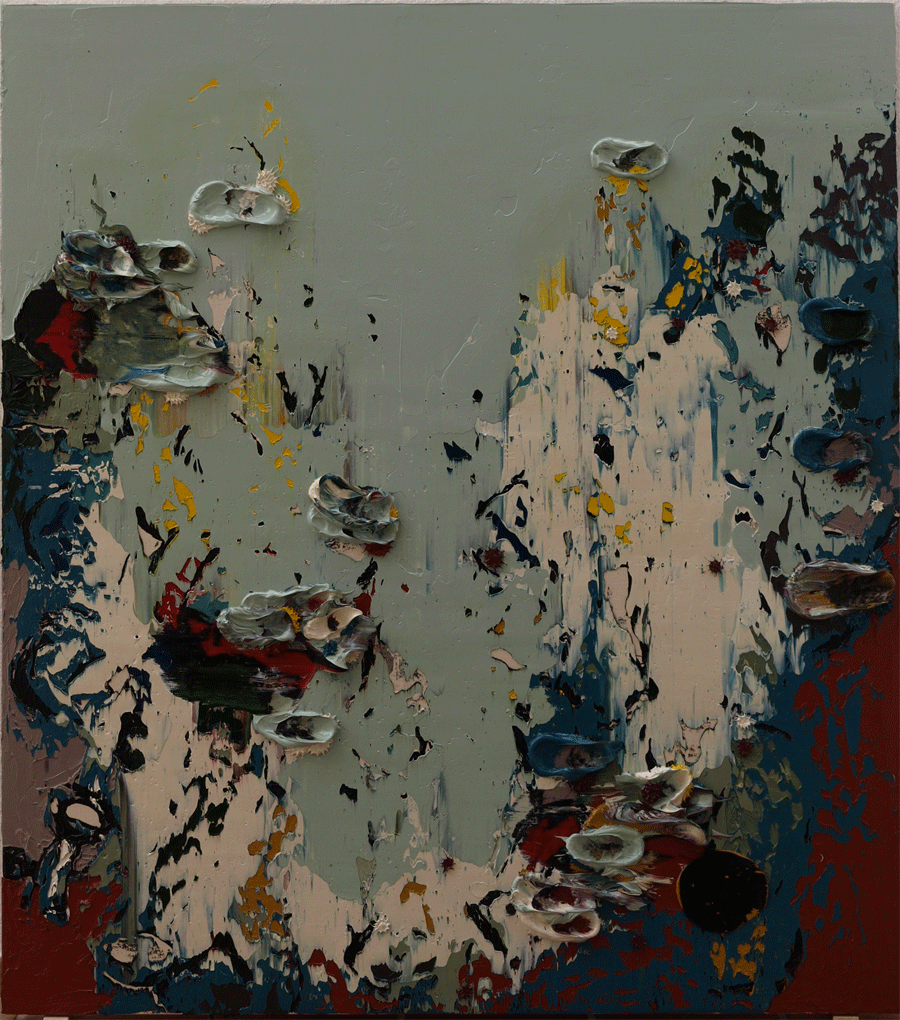
ww#309

ww#310
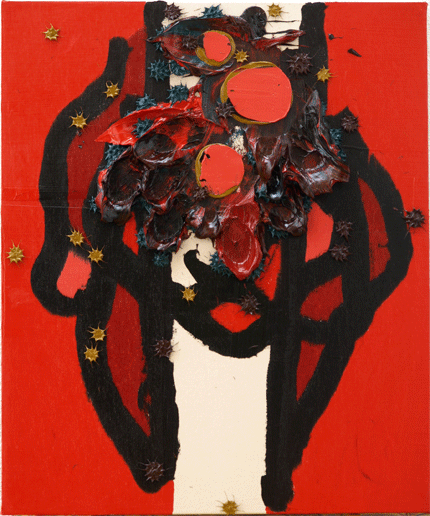
ww#311
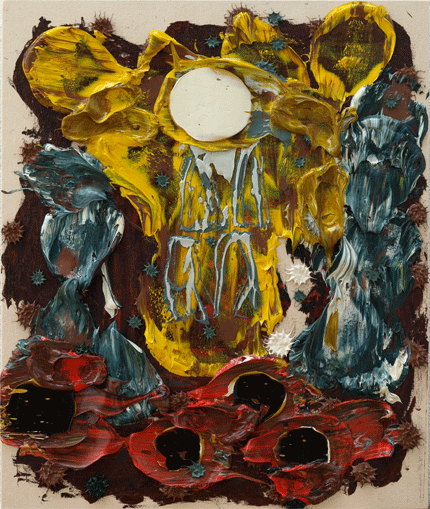
ww#312
What you might see here is a wrestle with an aspect of drawing that I am seeking in order to disturb things a bit. #309 is a buried drawing and #310 is a kind of exposition of various states of drawing and erasure all deployed in tension in relation to one another. I have this abiding notion of painting as a dynamic tension between drawing (that which delineates, divides and makes distinctions) and flowing (the state of media as is proceeds out of one's direct control). Ever since I left grad school, I took a dim view of the mandate for all artists to straddle all media and after I digested the idea of the dead author (late 80's critical theory) and the evaporation of materiality in favor of some kind of conceptualist's nirvana (the fruit of the PostModern tree), I was determined not only persist in painting, but to embrace both its' material presence and especially a deliberate entanglement within its' realm. (I'm not exactly sure why, but the image of a happy Laoco?n comes to mind with this topic.)
My favorite method of navigation in painting practice is tacking. After persisting in one direction for a time, I tend to favor something completely different, bearing in mind that the maxim (a source now lost to my memory) that "...to become conscious, one must become aware of contrast". So after reprising the idea in a more compact and modest form in #311, I flung all procedures out of the window to scoop and plop my way into a completely different approach in #312.
And this is where I now am, a bit excited with a new discovery as I stand up the next large panel in my studio for this week's new adventure. Lots of work to do, still.
As a postscript, here is a video I was about to delete. It is essentially a repetition of an earlier one, and therefore a bit redundant. But here it is anyway, a small note in passing:

